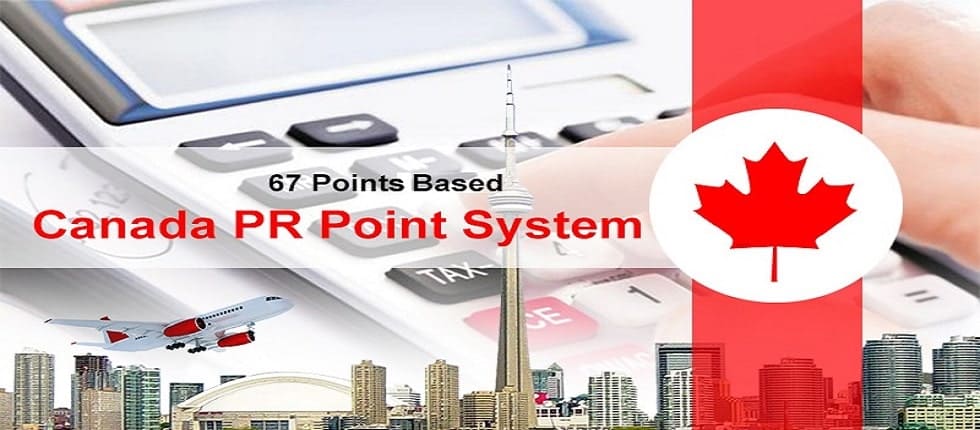The Canadian immigration points system belongs to the Express Entry program. Express Entry is a way to select skilled workers for Canadian immigration. Proficient immigrants seeking their PR in Canada must have an idea about this point-based system. Let’s learn about it.
Immigration schemes under Express Entry
The Express Entry program works through an online system that maintains and processes the immigration applications submitted by skilled workers. Three immigration programs are managed through express entry named as
- Canadian Experience Class – For immigrants with Canadian work experience
- Federal Skilled Worker Program – Having work experience in a foreign country
- Federal Skilled Trades Program – Having skilled trade qualification
When people want to immigrate to Canada through the Express Entry program, they need to create a profile. In their profile, they add information related to their age, language skills, education, work experience, and other factors. This data is used to determine their Comprehensive Ranking System (CRS) score, which signifies their total immigration points. The CRS score governs how likely they are to receive an Invitation to Apply (ITA) for Canadian immigration.
The Canadian government holds Express Entry draw approximately every fortnight. In these draws, they invite the candidates with the highest CRS scores to apply for immigration. They set a minimum CRS score, known as the cut-off score, for each draw. Only candidates with CRS scores higher than the cut-off score receive an ITA for Canadian immigration. The maximum CRS score a candidate can have is 1200 points.
So, in simple words, the Canadian immigration points system refers to the CRS score that candidates receive based on their profile information. The CRS score is directly proportional to the chances of receiving an invitation to apply for immigration to Canada. A high score means a better chance for ITA.
Comprehensive Ranking System Score – Basic Factors
Candidates who get a score of more than 67 are eligible to apply under Express Entry. Keep in mind that the CRS score is different from this score. So let’s see what are basic factors to calculate your CRS points
- Age: Candidates who are above 20 and below 29 score maximum points for the age factor. A maximum of 110 points are reserved for immigrants without spouses.
- Education: Higher levels of education, such as a bachelor’s degree, master’s degree, or Ph.D., are awarded 150 points. While masters can attain a maximum of 135 points for their education. Two or more degree holders can bag 128 points. Similarly, with a bachelor, diploma (2 years), Diploma (1 year), and 12th pass qualification you will be given 120, 98, 90, and 30 points respectively.
- Language skills: Proficiency in English and/or French is calculated through language tests such as IELTS or CELPIP (for English) and TEF (for French). Higher scores lead to more points. The maximum you can score is 136 points. CLB 10 or more means you score 34 points for each module of communication (speaking, listening, writing, and reading). If you also know the French language, then an additional maximum of 24 points will be added to your CRS.
- Work Experience: The CRS tool considers the candidate’s work experience based on the number of years worked in a skilled occupation. More points are awarded for a longer duration of work experience.
- Canadian Work Experience: Candidates with previous work experience of 5 years in Canada receive a maximum of 80 points as it demonstrates their adaptability to the Canadian labor market. Similarly, points go down as your years of work decrease.
- Arranged Employment: Having a valid job offer from a Canadian employer can significantly boost a candidate’s CRS score.
- Provincial Nomination: Obtaining a nomination from a Canadian province or territory through their Provincial Nominee Program (PNP) can provide additional CRS points.
- Spouse/Common-Law Partner Factors: If the candidate has a spouse or common-law partner, their education, language proficiency, and work experience can contribute to the CRS score.
- Siblings in Canada: Having a sibling residing in Canada as a Canadian citizen or permanent resident can earn additional CRS points.
- Adaptability: The CRS tool also takes into account other factors such as previous study or work experience in Canada, the language proficiency of the spouse/partner, and other adaptability factors that indicate a candidate’s potential to integrate successfully into Canadian society.
Need help to calculate your CRS score – Contact Western Overseas
If you’re an immigrant hoping to apply for Express Entry, it’s good to get guidance from the experts at Western Overseas. They are RCIC-certified VISA consultants dealing in different VISA categories and immigration programs. They provide accurate detail and the best assistance to proceed with. You can trust them for your PR application. Their success rate is considerably high, making them the most reliable immigration Consultant in Canada. Get your profile evaluated by their experts, and stay in Canada for the rest of your life.





